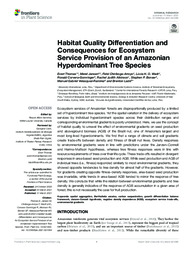Habitat quality differentiation and consequences for ecosystem service provision of an amazonian hyperdominant tree species.
Habitat quality differentiation and consequences for ecosystem service provision of an amazonian hyperdominant tree species.
Author(s): THOMAS, E.; JANSEN, M.; CHIRIBOGA-ARROYO, F.; WADT, L. H. de O.; CORVERA-GOMRINGER, R.; ATKINSON, R. J.; BONSER, S. P.; VELASQUEZ-RAMIREZ, M. G.; LADD, B.
Summary: Ecosystem services of Amazonian forests are disproportionally produced by a limited set of hyperdominant tree species. Yet the spatial variation in the delivery of ecosystem services by individual hyperdominant species across their distribution ranges and corresponding environmental gradients is poorly understood. Here, we use the concept of habitat quality to unravel the effect of environmental gradients on seed production and aboveground biomass (AGB) of the Brazil nut, one of Amazonia's largest and most long-lived hyperdominants. We find that a range of climate and soil gradients create trade-offs between density and fitness of Brazil nut trees. Density responses to environmental gradients were in line with predictions under the Janzen-Connell and Herms-Mattson hypotheses, whereas tree fitness responses were in line with resource requirements of trees over their life cycle. These trade-offs resulted in divergent responses in area-based seed production and AGB. While seed production and AGB of individual trees (i.e., fitness) responded similarly to most environmental gradients, they showed opposite tendencies to tree density for almost half of the gradients. However, for gradients creating opposite fitness-density responses, area-based seed production was invariable, while trends in area-based AGB tended to mirror the response of tree density. We conclude that while the relation between environmental gradients and tree density is generally indicative of the response of AGB accumulation in a given area of forest, this is not necessarily the case for fruit production.
Publication year: 2021
Types of publication: Journal article
Unit: Embrapa Rondônia
Keywords: Aboveground biomass, Bertholletia Excelsa, Biomassa aérea, Brazil nuts, Carbon sequestration, Castanha do Para, Castanha do brasil, Ecosystem services, Environmental gradients, Espécies hiperdominantes, Essência Florestal, Forest trees, Gradiente ambiental, Growth differentiation balance framework, Hyperdominant tree species, Janzen-Connell hypothesis, Negative density dependence (NDD), Produção de Sementes, Seedling production, Sequestro de carbono, Serviços ecossistêmicos
Observation
Some of Embrapa's publications are published as ePub files. To read them, use or download one of the following free software options to your computer or mobile device. Android: Google Play Books; IOS: iBooks; Windows and Linux: Calibre.
Access other publications
Access the Agricultural Research Database (BDPA) to consult Embrapa's full library collection and records.
Visit Embrapa Bookstore to purchase books and other publications sold by Embrapa.

